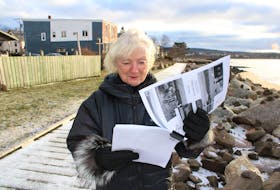
Members of St. John’s city council, take note: if you happen to be near a TV Thursday night, filmmaker Barbara Doran would like you to tune in to CBC.
Doran’s latest documentary, “Life Below Zero,” co-produced with filmmaker Josh Freed, will air on “Doc Zone” Thursday at 9:30 p.m., exploring why typical Canadians hate winter, and how some countries love and prepare for it.
While Canadians have an international reputation for being the hardy, outdoor type, loving the snow and able to brave the winter elements with ease, we’re actually winter wimps, Doran said.
What happened to us?
“We’ve turned into a nation of complainers. We complain about the temperature. We complain about the amount of snow,” Doran said. “In some ways we’re right to complain, particularly in Newfoundland and particularly in St. John’s, where we don’t have cleared sidewalks.”
Doran and Freed examined how the winter weather affects our daily routines and national values, which they say change the more we become insular, indoor creatures and Florida-bound snowbirds. In the light-hearted documentary, they study what’s happened to our Canadian “cold” genes and what we can learn from other cultures when it comes to winter.
Our winter love affair may not be totally lost, Doran said — there’s the Carnaval de Québec and the Labrador Games, among other winter events, but the celebration of the season seems to be only on a superficial, festival level.
In Sweden and Norway, Doran said, winter is embraced — to the point where some cities are designed around it.
“They heat the downtown streets, so there’s a huge section of the downtown that’s closed to traffic and you’ll see people in the middle of the day in wheelchairs, on crutches, mothers pushing baby strollers and outdoor cafes where people are sitting around sipping their coffee or a beer,” she explained.
“They’ve done a cost analysis — and this is something I hope city council tunes in tomorrow night to watch — and when you factor in the price of snowclearing and the cost of equipment and the cost of the environmental factors of all of that salt and filth getting dumped in the harbour or into rivers, and the cost of traffic accidents and slip and falls, they have worked out that it’s the same amount of money. However, you add so much to people’s quality of life.”
Russians are another winter-loving group of people, Doran said, and the “Life Before Zero” crew filmed there on Jan. 18, on the Feast of the Epiphany, when half a million of them jump into the icy water. They believe it boosts immunity, Doran said.
“It was like minus 30 degrees the night we were filming there, and the thought of sticking a finger in the freezing water was too much for any of us,” she explained. “I thought they’d all be pumped with vodka, Russian courage, but, in fact, no. The youngest person we saw was a little girl who was seven years old, and there were men in their 80s and 90s, jumping in the icy water.”
Instead of cozying up inside during the winter months, Russians relish the cold weather, Doran learned, holding dances, markets and barbecues outside.
“Their belief is we’re going to have winter for eight months of the year, so let’s get out and enjoy it,” she said. “It’s an inspiration to all of us, I think.”
Twitter: @tara_bradbury









